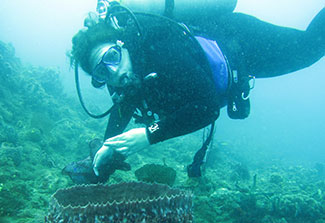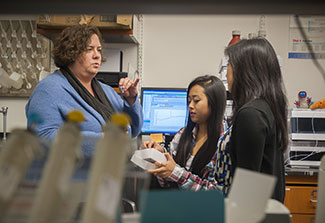IRSDA alumna Dr Marcy Balunas explores marine life to find new cancer drugs
July / August 2017 | Volume 16, Issue 4

Photo courtesy of Dr. Balunas
As an IRSDA grantee studying marine life in Panama,
Dr. Marcy Balunas developed scientific and mentoring
skills that helped prepare her for an academic research
career.
In a quest for new drugs to fight cancer and other diseases, Dr. Marcy Balunas explores the marine environment. A medicinal and natural products chemist, Balunas collects bacteria and other marine organisms, isolates compounds from them, and investigates their potential to be transformed into treatments.
The research she conducts today as a newly tenured associate professor at the University of Connecticut links back to her Fogarty grant for early career scientists. Balunas held an International Research Scientist Development Award (IRSDA) from 2009 to 2012, which supported her work in Panama.
As part of her Fogarty-funded research, Balunas studied marine cyanobacteria for use against three tropical diseases - malaria, Chagas disease and leishmaniasis - as well as cancer. Cyanobacteria are similar to plants in that they get their energy through photosynthesis. They are highly nutritious and their visible presence on a reef indicates they likely have some property to ward off predators, which could be explored to fight disease.
"The marine and terrestrial diversity in Panama is outstanding," Balunas says of the small country that's bordered by the Pacific Ocean and Caribbean Sea - two very different environments. "Panama is an ideal place for this type of work."
Indeed, for more than 15 years Panama was among the sites in a Fogarty-run research and training program to mine nature for new drugs and preserve natural resources. The International Cooperative Biodiversity Groups (ICBG) program in Panama was headed by Dr. William Gerwick of the University of California, San Diego. Balunas was a postdoc working with Gerwick and the Panamanian ICBG on cancer and other drug discovery when she got her own Fogarty award. The ICBG program in Panama was established by Drs. Phyllis Coley and Tom Kursar, both of the University of Utah.
"I learned much more about mentoring than I ever would as a traditional postdoc," and that experience, she says, helped her avoid some of the growing pains of a beginning professor when she started at the University of Connecticut.
Dr. Marcy Balunas
Former Fogarty IRDA grantee
Balunas isolated and identified several novel compounds from specimens collected in Panama, but those weren't the only outcomes. She also enhanced her skills in synthetic chemistry and chemical instrumentation including those related to nuclear magnetic resonance and mass spectrometry. "I had used the instruments as a Ph.D. student. But as an IRSDA grantee I had to learn how to take care of them and how to better understand them. That most assuredly continued to help me in my independent career."
In addition to learning Spanish, mentoring was another skill she built. With support from the Panamanian government, Balunas trained local scientists in natural product drug discovery. "I trained students in Panama to take on science at a new level," she says. "Some of them have gone on to work towards their Ph.D.s, so that's exciting." She also mentored U.S. students through in an NIH program that exposes minority students to research in international settings. "I learned much more about mentoring than I ever would as a traditional postdoc," and that experience, she says, helped her avoid some of the growing pains of a beginning professor when she started at the University of Connecticut.

Photo by Sean Flynn/UConn
Dr. Marcy Balunas (left), medicinal and natural products
chemist and newly tenured associate professor at the
University of Connecticut, trains the next generation of
researchers, using mentoring skills honed during her IRSDA
grant.
In her UConn lab, Balunas uses techniques similar to her work in Panama, but focuses on different organisms. Her team studies bacteria that live with tunicates - also known as sea squirts - from Panama, Alaska and the Long Island Sound, and looks for immune enhancers and immune suppressors for cancer and other diseases.
Her interest in drug discovery is personal - both her grandmother and mother died from breast cancer. Balunas took time off from working on a master's degree related to biology to care for her mom. "When she died, it was a real impetus to refocus and think about drug discovery, most specifically breast cancer drug discovery."
"This very clearly is what I am supposed to be doing."
More Information
To view Adobe PDF files,
download current, free accessible plug-ins from Adobe's website.